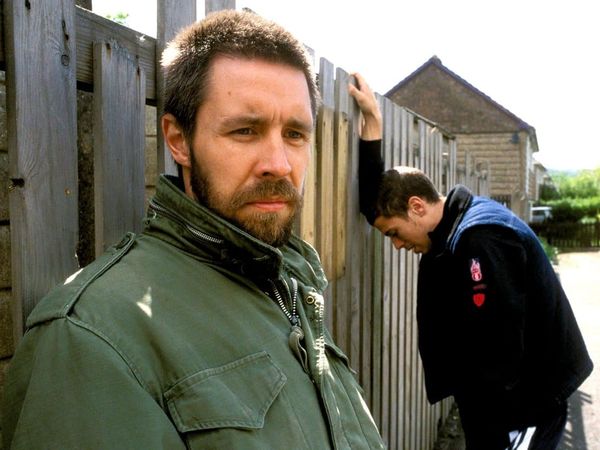Eye For Film >> Movies >> Dead Man's Shoes (2004) Film Review
Dead Man's Shoes
Reviewed by: Jennie Kermode

With a strong opening cutting between cine-film of children playing, and two men strolling through the beautiful but bleak landscape of rural Derbyshire, Dead Man's Shoes at once reveals that it has a character all its own. Whether or not one likes that character is beside the point. This is a gripping and surprisingly affecting story, a revenge thriller interested in more than macho posturing. Despite its amoral perspective, it has a deeply moral tone, and a complex one.
Telling the tale of one man's attempts to avenge his learning disabled brother's abuse at the hands of a gang of small-town pikeys, this film inevitably attracts comparisons with Get Carter, tough competition for any piece of work, yet its central concerns are elsewhere. Protagonist Richard (In America's Paddy Considine) is having more difficulty dealing with his own confused fraternal feelings than with anyone in the external world. The burden of guilt which he places on his own shoulders is, from the start, perhaps as great as anyone else's.

There are periods during which this film ventures onto Death Wish territory, and there it is at its least interesting, but for the most part its approach is more sophisticated. It reaches beyond the usual limits of the genre by presenting all its characters as rounded human beings, even if they are crude, unpleasant ones. After building up sympathy with the avenger, it turns around to show us a group of petty criminals as scared and vulnerable as the formula group of teenagers stalked by a serial killer, forcing the audience to acknowledge the human suffering on both sides. This careful balancing act is sustained throughout the film, and is paralleled by Richard's awareness of his own gradual dehumanisation. With his brother unable to support him, his once-admired physical prowess is turned to destruction, and we begin to realise just how vital the disabled youth's emotional input was.
Dead Man's Shoes is filmed in a raw, up-close naturalistic style reminiscent of early Ken Loach, but much more successful. Some viewers may find the thick Matlock accents difficult to decipher, and much of the dialogue takes the form of muttering or incoherent rambling (especially during scenes involving drug use), but all the essential information is clearly delivered, and the sometimes confused babble contributes to the mood. This helps to put across the fact that there are huge numbers of people who really do live and act this way, albeit generally with less extreme consequences.
As a study of drug dealing and petty violence in isolated English towns, it is accurate and unfussy, illustrating the ridiculousness (five gangsters and a shotgun all crammed into a Citroen 2CV) of the situation as well as its ugliness (the suffering of the disabled boy, the abuse of women). Its matter-of fact observation of events has the effect of making the viewer feel uncomfortably close to what's happening. As a result, it has a far greater emotional impact than most of its ilk.
Reviewed on: 03 Oct 2006




















